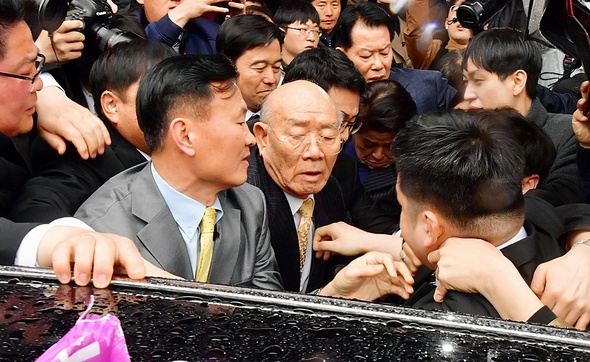Posted on : Mar.12,2019 17:08 KST
Modified on : Mar.12,2019 17:16 KST
 |
|
Ex-president Chun Doo-hwan, who is on trial for defamation of the deceased, gets into a car in front of the Gwangju District Court after his trial on Mar. 11. (photo pool)
|
On Mar. 11, ex-president Chun Doo-hwan, who is charged with defamation of the deceased, was finally put on trial in a Gwangju courthouse. This came 39 years after he perpetrated what is known as the Gwangju Massacre (Gwangju Democratization Movement) and 31 years after he left the presidency. After failing to appear in court several times, complaining of a bad cold and dementia, he finally appeared in Room No. 201 of the Gwangju District Court, after hearing that the court was planning to put him under arrest if he didn’t show up.
Chun is fully aware that the public interest that he’s receiving doesn’t merely concern the question of whether or not he’s guilty of defamation. Efforts to uncover the truth about what happened in Gwangju 39 years ago are still underway. There are still many things left to uncover, including not only an incident in which helicopters allegedly opened fire on civilians, which is the main question in Chun’s trial, but also the question of who gave the orders to fire as well as the incidents sexual assault and torture that have recently come to light. It goes without saying that Chun himself is the person with the greatest knowledge of these things.
Chun is charged with libeling the late Catholic priest Cho Cheol-hyeon (also known as Cho Pius), who testified that he’d witnessed government troops in helicopters firing upon Gwangju civilians. In his memoir, Chun bashed the priest as a “shameless liar.” Investigations by the Ministry of National Defense (MND) and prosecutors have already confirmed gunfire from helicopters during the Gwangju Uprising in May 1980, with the National Forensic Service verifying some 150 bullet holes in January 2017. But since Chun disregarded the objective facts to lash out at Cho in his memoir, which was published in April of the same year, it’s only fair that he pay the price for his defamation.
Chun needs to confess that not only did the helicopter fire upon civilians itself but that he gave the order to open fire in May 1980. On the evening of May 20, the 3rd Airborne Brigade shot and killed four civilians, in defiance of orders to hold fire and not use live ammunition given by its superior unit, the 2nd Army Command. An investigator from the 505 Security Unit has even testified that the Defense Security Command was behind the main decision for the unit to open fire. In addition, we have already learned that the military junta systematically fabricated reports and records. The truth is bound to come out once the commission charged with investigating the Gwangju Uprising begins its work.
Despite his claims of dementia, Chun appeared to be in relatively good health, aside from a little hardness of hearing. In the court, Chun’s legal team denied all the charges against him, as expected. It’s infuriating to see that Chun hasn’t changed in the slightest, showing no signs of remorse – this is still the same man who called himself an “offering in a purification ritual” and whose wife, Lee Sun-ja, ludicrously named him the “father of democracy.”
After Chun was pardoned in December 1997, the father of Yun Sang-won, one of the people killed in the Gwangju Uprising, wrote in his journal that he hoped that Chun and his cronies would reflect on their past deeds and cooperate for the nation’s future unity. But these hopes have been dashed by Chun. Far from showing any contrition for the massacre, he has even verbally assaulted its victims.
Chun’s behavior and the recent offensive remarks about the Gwangju Democratization Movement made by lawmakers with the Liberty Korea Party are a vivid illustration of the consequences of rushing to forgive and pardon such people. It’s a truism that genuine reconciliation and unity cannot be achieved without the perpetrator’s honest remorse and repentance. We hope that Chun will take this opportunity to confess the truth and repent before the people of Gwangju, the Korean nation and the tribunal of history. He doesn’t have much time left. The next hearing will be held on Apr. 8.
Please direct comments or questions to [english@hani.co.kr]






